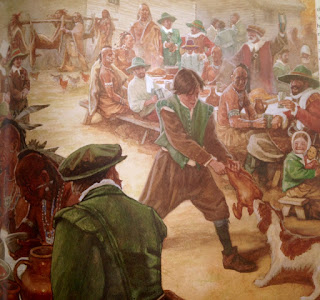Despite being a picture book, this is definitely a book for older children-- I'd say probably 10 and up. He lets readers into the mind of Howland which, while not being historically factual, helps kids put themselves in a Mayflower passenger's shoes. Being an adult, some of these thoughts and dialogues made me question how accurate some of the sentiments would have been at that time. For instance, there is a scene where Howland is given an order to steal corn from a native's home and he expresses how it weighs on his conscience. In reality, would he have cared about taking food from a native? I don't know, maybe. I think coming up with excuses for our ancestors' behavior to be problematic. But at least this is a way of conveying to kids that stealing did happen. There is also a scene where Squanto tells them how his whole village was killed off by a plague brought by the white man. So the author definitely tries not to gloss over the hard truths while still telling the story from Howland's point of view.
I also liked how he included "Lizzy" Tilley throughout the story. She has a pivotal role in the end especially. When Howland wants to sail back to London to make a fortune and suggests she go too, she tells him that her parents died trying to start a life in America and she won't let their dream and hard work be in vain, that there is still more work to do and neighbors to help. This persuades Howland to stay, which turns out to be a good thing because the boat that went back was attacked by pirates, and of course a couple years later he and Elizabeth marry. While her speech to Howland to persuade him to stay probably isn't accurate (although I don't know personally if that came from research or just an invention of Lynch), there isn't a reason why it couldn't be, and helps readers to imagine women at the time. It actually makes me want to read a story from Elizabeth Tilley's perspective now.
Overall, I thought this was a great book and definitely worth reading with older kids. It could open up a lot of questions and be great for having conversations about our history and its portrayal.
 |
| On The Mayflower |
 |
| Suffering the first winter |
 |
| Squanto showing them how to plant their crops and manure the fields |
 |
| Thanksgiving |


No comments:
Post a Comment